
A tutorial on reasoning skills focusing on both inductive and deductive reasoning. Has several examples and exercises with answers and discussion.
- Subject:
- Mathematics
- Material Type:
- Module
- Provider:
- West Texas A&M University
- Date Added:
- 10/03/2023

A tutorial on reasoning skills focusing on both inductive and deductive reasoning. Has several examples and exercises with answers and discussion.

Biology 2e is designed to cover the scope and sequence requirements of a typical two-semester biology course for science majors. The text provides comprehensive coverage of foundational research and core biology concepts through an evolutionary lens. Biology includes rich features that engage students in scientific inquiry, highlight careers in the biological sciences, and offer everyday applications. The book also includes various types of practice and homework questions that help students understand—and apply—key concepts. The 2nd edition has been revised to incorporate clearer, more current, and more dynamic explanations, while maintaining the same organization as the first edition. Art and illustrations have been substantially improved, and the textbook features additional assessments and related resources.

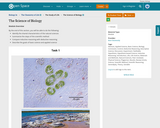
By the end of this section, you will be able to do the following:
Identify the shared characteristics of the natural sciences
Summarize the steps of the scientific method
Compare inductive reasoning with deductive reasoning
Describe the goals of basic science and applied science
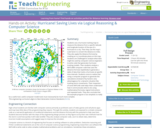
Students use a hurricane tracking map to measure the distance from a specific latitude and longitude location of the eye of a hurricane to a city. Then they use the map's scale factor to convert the distance to miles. They also apply the distance formula by creating an x-y coordinate plane on the map. Students are challenged to analyze what data might be used by computer science engineers to write code that generates hurricane tracking models. Then students analyze a MATLAB® computer code that uses the distance formula repetitively to generate a table of data that tracks a hurricane at specific time intervals. Students come to realize that using a computer program to generate the calculations (instead of by hand) is very advantageous for a dynamic situation like tracking storm movements. Their inspection of some MATLAB code helps them understand how it communicates what to do using mathematical formulas, logical instructions and repeated tasks. They also conclude that the example program is too simplistic to really be a useful tool; useful computer model tools must necessarily be much more complex.

Psychology is designed to meet scope and sequence requirements for the single-semester introduction to psychology course. The book offers a comprehensive treatment of core concepts, grounded in both classic studies and current and emerging research. The text also includes coverage of the DSM-5 in examinations of psychological disorders. Psychology incorporates discussions that reflect the diversity within the discipline, as well as the diversity of cultures and communities across the globe.Senior Contributing AuthorsRose M. Spielman, Formerly of Quinnipiac UniversityContributing AuthorsKathryn Dumper, Bainbridge State CollegeWilliam Jenkins, Mercer UniversityArlene Lacombe, Saint Joseph's UniversityMarilyn Lovett, Livingstone CollegeMarion Perlmutter, University of Michigan



By the end of this section, you will be able to:
Explain how scientific research addresses questions about behavior
Discuss how scientific research guides public policy
Appreciate how scientific research can be important in making personal decisions

A simple discussion of the differences between inductive and deductive reasoning. Helpful to anyone who is having difficulty differentiating between the two.

This site provides a good explanation of deductive and inductive thinking.
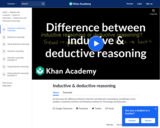
This 2-minute video lesson explores deductive reasoning (part 1). [Statistics playlist: Lesson 79 of 85]
Khan Academy learning modules include a Community space where users can ask questions and seek help from community members. Educators should consult with their Technology administrators to determine the use of Khan Academy learning modules in their classroom. Please review materials from external sites before sharing with students.
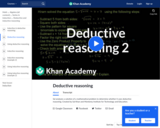
This 4-minute video lesson continues to explore deductive reasoning (part 2). [Statistics playlist: Lesson 80 of 85]
Khan Academy learning modules include a Community space where users can ask questions and seek help from community members. Educators should consult with their Technology administrators to determine the use of Khan Academy learning modules in their classroom. Please review materials from external sites before sharing with students.
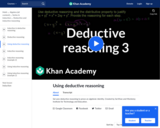
This 4-minute video lesson continues to explore deductive reasoning (part 3). [Statistics playlist: Lesson 81 of 85]
Khan Academy learning modules include a Community space where users can ask questions and seek help from community members. Educators should consult with their Technology administrators to determine the use of Khan Academy learning modules in their classroom. Please review materials from external sites before sharing with students.

This free encyclopedia site from Wikipedia gives a definition and examples of deductive reasoning. It also has links to related terms and topics.